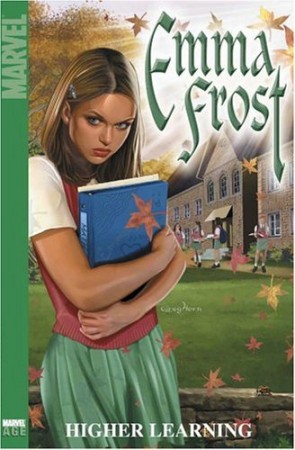| Emma
Frost: Higher Learning
In an effort
to bring in more female readers and try to pull more readers
away from manga, Marvel started putting out a new line of
titles featuring female protagonists; Arana: Heart of
the Spider, Mary Jane and Amazing Fantasy are
all examples, and they’ve met with mixed reviews (some
even written by me). In combination with this push of female
protagonists and the re-expansion of the x-books, everyone’s
favorite telepathic, diamond skinned former villain, Emma
Frost, managed to get her own comic. While not the MAX series
I’m sure some fanboys were rooting for, it is the story
of Emma’s youth. Following her time spent at an exclusive
boarding school, the reader is introduced to a shy, introverted
Emma who is possessed of a family that would make the Menendez
brothers think they had it good. As her ability to read minds
begins to manifest, Emma begins the process of becoming the
icy femme fatale we all know and love.
The
origins of Emma are not exactly clouded in mystery to the
average comic book reader, as there have been many references
to life before the X-Men, so the set up for the character,
while it seems pretty in sync with her history, is also
very predictable. The reader is most likely aware of Emma’s
mental powers, so the revelations of Emma hearing voices
and seeing thoughts hold little excitement for the reader.
I must applaud writer Karl Bollers for his light touch in
using Emma’s telepathy as a storytelling device. A
worse writer might have given Emma full use and control
of her powers too early, but Bollers allows Emma’s
powers to come to her in fits and spurts and with very little
conscious control on her part. Emma reads people by accident
half the time, usually in response to stressful situations.
The times she actively uses it are cleverly written without
thought balloons or dialogue boxes, but just Emma “reading”
the thoughts she needs and using them in her own dialogue.
It’s a very organic treatment of a mutant coming into
her powers and for that Bollers can be congratulated.
For
the rest of the book, congratulations are not in order.
The entire first volume is, looks, and feels just like set-up
for the next story arch in which Emma is out on her own
and using her powers in the real world. Every character,
every scene seems devoted to this one goal and it makes
for very boring reading.
Not
helping this is Bollers supreme lack of characterization.
Every character is a stereotype. Emma is the awkward girl
who finally gets the ability to change her station in life;
no friends, bad grades, and no life outside school make
her the quintessential geek and the fact that most readers
know that Emma becomes a blonde sex-pot in later life makes
this paltry attempt at defining the character ring false.
This may be a problem that any writer attempting to go back
and create the origins of a well-known character every writer
might face, but Bollers puts little effort into making Emma
anything more than “the mousy girl.”
Equally
disappointing is Emma’s family, as it turns out to
be not only stereotypical, but grossly exaggerated stereotypes.
There is the older brother Christian who is Emma’s
only friend, her only support, who also happens to be a
closeted homosexual in fear of telling his family. Her older
sister Adrienne is the oldest, prettiest and bitchiest daddy’s
girl who will tattle on her siblings at any time, even record
their conversations, if it means her father will approve
of her. There’s the younger, attention-starved daughter
who adopts a goth/punk persona and does drugs in order to
be “rebellious.” The mother is a pill-popping
woman in denial of her husband’s infidelities, even
after being given proof.
By far
the worst character is the patriarch Winston Frost; the
Mussolini-strict man who prefers to hold a noose around
the neck of all of his children, for fear of their behavior
reflecting badly on him, while simultaneously being the
most utter of bastards. He cheats on his wife, orchestrates
complex schemes to catch his children doing the things he
disapproves of. Her family is so ridiculously over the top
that it is laughable, but the story doesn’t get to
be even unintentionally interesting because the story is
so unsurprising that paint drying would sell out Madison
Square Garden by comparison. Even less important characters
are spectacular nods to convention: there’s the dutiful
butler, the overly compassionate teacher, the mean-for-no-reason
school bully…it just goes on. No attempts at depth
or even intelligence are made when Bollers defines his characters
and it drives another nail in the coffin.
The
artwork is as equally bad and predictable. Randy Green’s
style is a hold-over from the Michael Turner era; I swear
I was reading Witchblade at one point, though not
as detailed and busty. Green suffers from facial sameness
and stick-figure anatomy. And Greg Horn’s covers are
just plain embarrassing, as his pin-ups of the current Ms.
Frost have nothing to with the story in the book. Way to
pander, Horn.
Perhaps
the only redeeming thing about the book is its $7.99 price
tag, but even that is a waste of money spent on better comics.
Maybe Bollers picks things up in the second volume, but
I won’t be around to see it.
Emma Frost: Higher Learning
|






